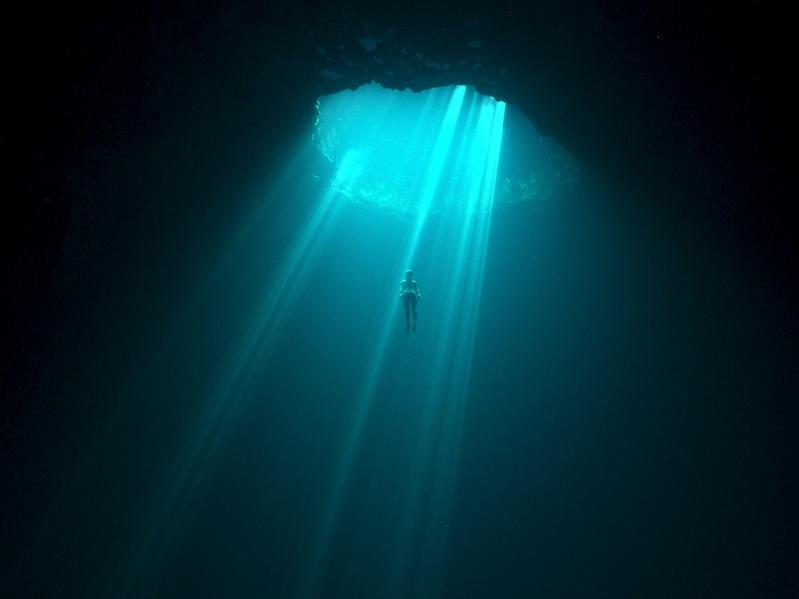If you don't know what freediving is, you will after the first five minutes of "The Deepest Breath," Laura McGann's mesmerizing, suspenseful documentary. The film opens with a 20-second clip of a woman identified only as Alessia, who tells her unseen interlocutor, "Honestly, I don't think about death. I'm not afraid of death."
Cut to a figure in the water, wearing only a wetsuit, goggles, and a nose clip. As she disappears into the sea, we hear, "Alessia Zecchini. Italy. Four minutes, world record attempt." An intertitle explains: "Each freedive in the film is undertaken on a single breath."
For the next three and a half minutes, the viewer descends with Ms. Zecchini. There is no snorkel, no scuba tank, just her graceful descent into ever deeper and darker water, accompanied on the soundtrack by the thump of rapid heartbeats.
After reaching a platform at the aimed-for depth, she begins her ascent, pulling herself up through brighter and brighter water until, surrounded by other divers, she breaks the surface into bright daylight, vibrant color, and a flurry of activity. The viewer feels he or she has surfaced as well.
"There's no point in my starting to tell the story unless people know what freediving is and what the stakes are," said Ms. McGann during a phone conversation from her home in Ireland. "The only way you really can wrap your head around what they actually do is to spend the time going down with them. A three-minute shot with barely any cuts is an unusual way to start a documentary. But it just was the right thing, we felt, for this film."
Next up on Saturday in HamptonsFilm's SummerDocs series, "The Deepest Breath" is the story of Ms. Zecchini's passion for freediving and her determination to set a new world record in a dangerous extreme sport, and also of Stephen Keenan, a free-spirited Irish adventurer who fell in love with the sport in Dahab, Egypt, and opened a freediving center there.
Not long after the two meet, he begins coaching her and serving as chief of safety while she competes in 2017 in Vertical Blue, an important competition in the Bahamas. Vertical Blue, and a second diving attempt the same year at the dangerous Blue Hole in Dahab, are central to the film, but the lives of both Ms. Zecchini and Mr. Keenan are filled in with home movies, archival material, and interviews.
When she first read about Mr. Keenan and Ms. Zecchini in 2017, Ms. McGann didn't know what freediving was. "I started to look at videos and saw these incredible images and these divers with no air, holding their breath, and behaving more like seals and dolphins than human beings."
The underwater footage was captivating enough, but "as I learned more about Stephen and Alessia, my interest in the story grew much deeper, and I felt like there was something really special, a really special story that took place in this incredibly beautiful world. It kind of went from there."
While her research on the film didn't begin until 2020, and shooting didn't start until a year later, Ms. McGann managed to create a film so immediate and engrossing that it was a surprise to learn that it came together after the key events of the story. Ms. McGann and her crew filmed some recreations, but most of the material came from "treasure trove after treasure trove" of pre-existing footage.
"I wanted it to unfold in front of your eyes, and that’s a hard thing to do in documentaries, where you’re not there for the story. So a lot of time and care went into putting those scenes together in a way that felt like we were there. Whether it had been shot with a GoPro camera or an iPhone or by a scuba diver, we would lean into what was already there."
The film moves seamlessly back and forth, from dramatic and hypnotic underwater footage, to the principals and locations central to the freediving world, to the backstories of Ms. Zecchini and Mr. Keenan, which unfold through home movie and archival footage and interviews with their fathers.
The two key challenges facing Ms. Zecchini are almost unbearably suspenseful. In the Bahamas for the Vertical Blue, she suffers blackouts on several dives before becoming locked in a back-and-forth battle with another diver also trying for the world record.
Diving in the Blue Hole in Dahab requires navigating the Arch, an 85-foot-long tunnel 184 feet below the Red Sea. The only woman to make it through the Blue Hole before Ms. Zecchini's attempt was Natalia Molchanova, the former female world champion. Ms. Molchanova died in 2015 while freediving off the coast of Spain.
As an example of how relatively small the field of champion freedivers is, and how dangerous it can be, in Kalamata, Greece, in 2013, after suffering a blackout on a dive, Mr. Keenan decided to become a safety diver, whose job is to protect other divers.
Ms. Molchanova's son, Alexey, the men's world champion, was going for the deepest dive ever in Kalamata when he blacked out and had to be saved by his first safety diver -- Mr. Keenan.
Ms. McGann said she speaks to Ms. Zecchini three or four times a week, and that the freediver is still at it, having broken her own world record four weeks ago with a dive to 123 meters.
"The Deepest Breath" will be shown Saturday at 7 p.m. at the East Hampton Cinema. After the showing, Ms. McGann will discuss the film with David Nugent, HamptonsFilm's artistic director. "I've never been to the Hamptons before," she said, "so I'm super excited."
Tickets are $35.




